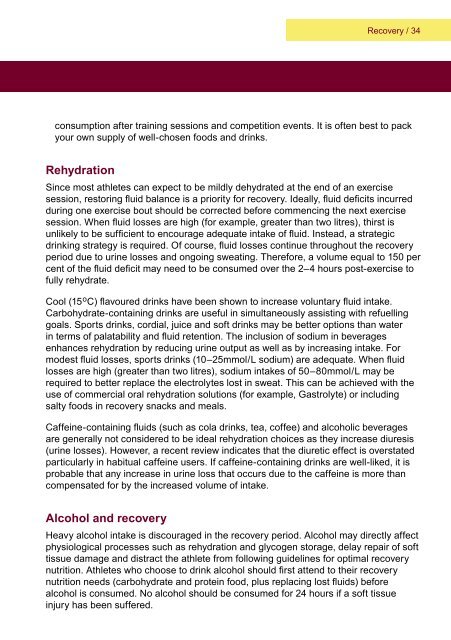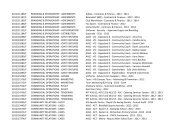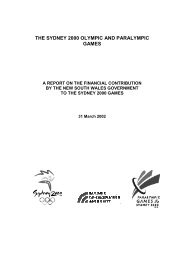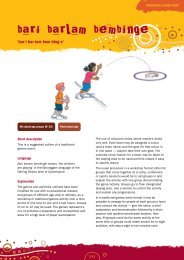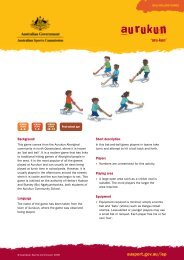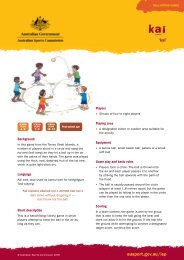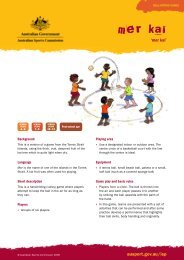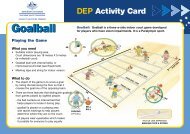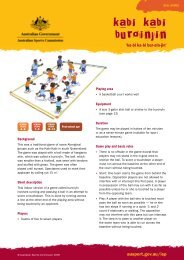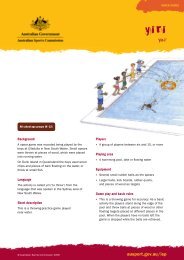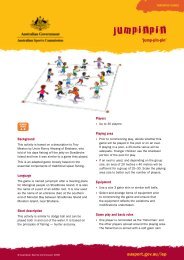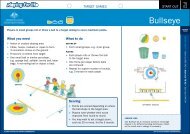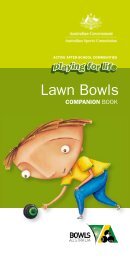Current Concepts in Sports Nutrition - Australian Sports Commission
Current Concepts in Sports Nutrition - Australian Sports Commission
Current Concepts in Sports Nutrition - Australian Sports Commission
Create successful ePaper yourself
Turn your PDF publications into a flip-book with our unique Google optimized e-Paper software.
Recovery / 34<br />
consumption after tra<strong>in</strong><strong>in</strong>g sessions and competition events. It is often best to pack<br />
your own supply of well-chosen foods and dr<strong>in</strong>ks.<br />
Rehydration<br />
S<strong>in</strong>ce most athletes can expect to be mildly dehydrated at the end of an exercise<br />
session, restor<strong>in</strong>g fluid balance is a priority for recovery. Ideally, fluid deficits <strong>in</strong>curred<br />
dur<strong>in</strong>g one exercise bout should be corrected before commenc<strong>in</strong>g the next exercise<br />
session. When fluid losses are high (for example, greater than two litres), thirst is<br />
unlikely to be sufficient to encourage adequate <strong>in</strong>take of fluid. Instead, a strategic<br />
dr<strong>in</strong>k<strong>in</strong>g strategy is required. Of course, fluid losses cont<strong>in</strong>ue throughout the recovery<br />
period due to ur<strong>in</strong>e losses and ongo<strong>in</strong>g sweat<strong>in</strong>g. Therefore, a volume equal to 150 per<br />
cent of the fluid deficit may need to be consumed over the 2–4 hours post-exercise to<br />
fully rehydrate.<br />
Cool (15 o C) flavoured dr<strong>in</strong>ks have been shown to <strong>in</strong>crease voluntary fluid <strong>in</strong>take.<br />
Carbohydrate-conta<strong>in</strong><strong>in</strong>g dr<strong>in</strong>ks are useful <strong>in</strong> simultaneously assist<strong>in</strong>g with refuell<strong>in</strong>g<br />
goals. <strong>Sports</strong> dr<strong>in</strong>ks, cordial, juice and soft dr<strong>in</strong>ks may be better options than water<br />
<strong>in</strong> terms of palatability and fluid retention. The <strong>in</strong>clusion of sodium <strong>in</strong> beverages<br />
enhances rehydration by reduc<strong>in</strong>g ur<strong>in</strong>e output as well as by <strong>in</strong>creas<strong>in</strong>g <strong>in</strong>take. For<br />
modest fluid losses, sports dr<strong>in</strong>ks (10–25mmol/L sodium) are adequate. When fluid<br />
losses are high (greater than two litres), sodium <strong>in</strong>takes of 50–80mmol/L may be<br />
required to better replace the electrolytes lost <strong>in</strong> sweat. This can be achieved with the<br />
use of commercial oral rehydration solutions (for example, Gastrolyte) or <strong>in</strong>clud<strong>in</strong>g<br />
salty foods <strong>in</strong> recovery snacks and meals.<br />
Caffe<strong>in</strong>e-conta<strong>in</strong><strong>in</strong>g fluids (such as cola dr<strong>in</strong>ks, tea, coffee) and alcoholic beverages<br />
are generally not considered to be ideal rehydration choices as they <strong>in</strong>crease diuresis<br />
(ur<strong>in</strong>e losses). However, a recent review <strong>in</strong>dicates that the diuretic effect is overstated<br />
particularly <strong>in</strong> habitual caffe<strong>in</strong>e users. If caffe<strong>in</strong>e-conta<strong>in</strong><strong>in</strong>g dr<strong>in</strong>ks are well-liked, it is<br />
probable that any <strong>in</strong>crease <strong>in</strong> ur<strong>in</strong>e loss that occurs due to the caffe<strong>in</strong>e is more than<br />
compensated for by the <strong>in</strong>creased volume of <strong>in</strong>take.<br />
Alcohol and recovery<br />
Heavy alcohol <strong>in</strong>take is discouraged <strong>in</strong> the recovery period. Alcohol may directly affect<br />
physiological processes such as rehydration and glycogen storage, delay repair of soft<br />
tissue damage and distract the athlete from follow<strong>in</strong>g guidel<strong>in</strong>es for optimal recovery<br />
nutrition. Athletes who choose to dr<strong>in</strong>k alcohol should first attend to their recovery<br />
nutrition needs (carbohydrate and prote<strong>in</strong> food, plus replac<strong>in</strong>g lost fluids) before<br />
alcohol is consumed. No alcohol should be consumed for 24 hours if a soft tissue<br />
<strong>in</strong>jury has been suffered.


